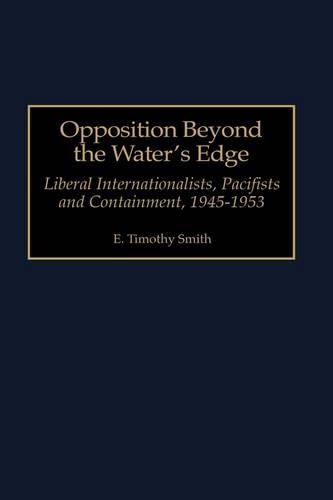
Opposition Beyond the Water's Edge: Liberal Internationalists, Pacifists and Containment, 1945-1953
(Hardback)
Publishing Details
Opposition Beyond the Water's Edge: Liberal Internationalists, Pacifists and Containment, 1945-1953
By (Author) E. Timothy Smith
Bloomsbury Publishing PLC
Praeger Publishers Inc
30th May 1999
United States
Classifications
Tertiary Education
Non Fiction
International relations
Central / national / federal government policies
General and world history
327.7304709044
Physical Properties
Hardback
200
Description
Despite the development of a consensus foreign policy during the early years of the Cold War that supported containment of the Soviet Union, there were both internationalists and pacifists who opposed the efforts of the Truman administration. These groups felt that American actions, including the Truman Doctrine, the Marshall Plan, the North Atlantic Treaty, and even the Korean War weakened the UN, threatened the Soviet Union with war, hindered European economic recovery, and promoted colonialism. Often mislabeled as isolationists, both the pacifists, with their traditional opposition to war, and the liberal internationalists, who supported efforts to continue the wartime alliance with the Soviets through the development of a strong UN, felt that the United States should play an active role in world affairs. The peace movement forces have been marginalized or dismissed as insignificant by many historians, however, while their impact was minimal in the late 1940s and early 1950s, their ideas would later re-emerge to have a strong impact on American policy, particularly in the ban the bomb and the antiwar movements of the Vietnam era. They continued to support efforts to maintain the Soviet alliance through the UN, to assist in the reconstruction of the world economy, to promote disarmament, and to end colonialism. While a commitment to these ideas would probably not have prevented the Cold War, it might have lessened its severity or slowed the arms race between the United States and the Soviet Union.
Reviews
Smith provides a sweeping (and quite readable) survey of American liberal and pacifist critics of the emerging Cold War. His book will be welcomed by students and faculty studying American pacifism.... Smith demonstrates a firm grasp of the secondary literature, especially work by diplomatic historians and histories of national peace organizations. The author's wide reading is supplemented by original archival research, especially in several of the rich collections found in the Swarthmore College Peace Collection.-Choice
"Smith provides a sweeping (and quite readable) survey of American liberal and pacifist critics of the emerging Cold War. His book will be welcomed by students and faculty studying American pacifism.... Smith demonstrates a firm grasp of the secondary literature, especially work by diplomatic historians and histories of national peace organizations. The author's wide reading is supplemented by original archival research, especially in several of the rich collections found in the Swarthmore College Peace Collection."-Choice
Author Bio
E. TIMOTHY SMITH is Professor of History and Chair of the Department of History and Political Science at Barry University in Miami, Florida. In addition to numerous articles and book reviews, he is the author of The United States, Italy and NATO, 1947-1952 (1991) and the co-editor of The Romance of History: Essays in Honor of Lawrence S. Kaplan (1997).
